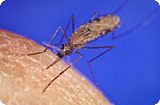séminaire du pôle évolution du vivant – vendredi 9 décembre 2011
The evolution of complete resistance to malaria parasites reduces the fitness of Anopheles gambiae mosquitoes
Maarten Voordouw, laboratoire de parasitologie, université de Neuchâtel, Suisse
vendredi 9 décembre 2011, à 11 heures, dans l’amphithéâtre Monge
Abstract
Trade-offs between anti-parasite defense mechanisms and other life history traits limit the evolution of host resistance to parasites and have important implications for understanding diseases such as malaria. Mosquitoes have not evolved complete resistance to malaria parasites and one hypothesis is that anti-malaria defense mechanisms are costly. We used matrix population models to compare the population growth rates among lines of Anopheles gambiae that had been selected for resistance or high susceptibility to the rodent malaria parasite, Plasmodium yoelii nigeriensis. The population growth rate of the resistant line was significantly lower than that of the highly susceptible and the unselected control lines, regardless of whether mosquitoes were infected with Plasmodium or not. The lower population growth of malaria-resistant mosquitoes was caused by reduced post blood-feeding survival of females and poor egg hatching. With respect to eradicating malaria, the strategy of releasing Plasmodium-resistant Anopheles mosquitoes is unlikely to be successful if the costs of Plasmodium-resistance in the field are as great as the ones measured in this study.
- extrait:
- lien_externe:
- titre:
- The evolution of complete resistance to malaria parasites reduces the fitness of Anopheles gambiae mosquitoes
- intervenant:
- Maarten Voordouw
- date:
- vendredi 9 décembre 2011
- kc_data:
- a:8:{i:0;s:0:"";s:4:"mode";s:0:"";s:3:"css";s:0:"";s:9:"max_width";s:0:"";s:7:"classes";s:0:"";s:9:"thumbnail";s:0:"";s:9:"collapsed";s:0:"";s:9:"optimized";s:0:"";}
- kc_raw_content:
The evolution of complete resistance to malaria parasites reduces the fitness of Anopheles gambiae mosquitoes
Maarten Voordouw, laboratoire de parasitologie, université de Neuchâtel, Suisse
vendredi 9 décembre 2011, à 11 heures, dans l'amphithéâtre Monge

Abstract
Trade-offs between anti-parasite defense mechanisms and other life history traits limit the evolution of host resistance to parasites and have important implications for understanding diseases such as malaria. Mosquitoes have not evolved complete resistance to malaria parasites and one hypothesis is that anti-malaria defense mechanisms are costly. We used matrix population models to compare the population growth rates among lines of Anopheles gambiae that had been selected for resistance or high susceptibility to the rodent malaria parasite, Plasmodium yoelii nigeriensis. The population growth rate of the resistant line was significantly lower than that of the highly susceptible and the unselected control lines, regardless of whether mosquitoes were infected with Plasmodium or not. The lower population growth of malaria-resistant mosquitoes was caused by reduced post blood-feeding survival of females and poor egg hatching. With respect to eradicating malaria, the strategy of releasing Plasmodium-resistant Anopheles mosquitoes is unlikely to be successful if the costs of Plasmodium-resistance in the field are as great as the ones measured in this study.
